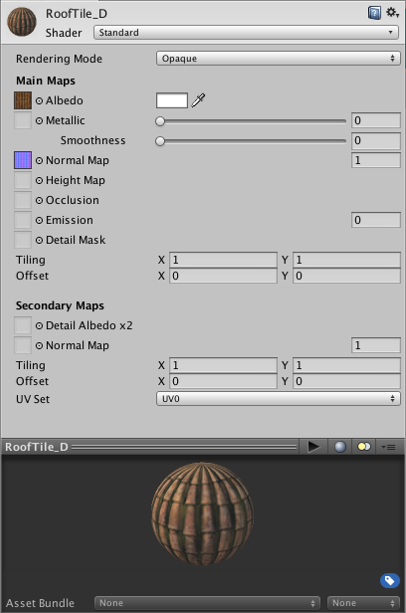Material Inspector reference
Switch to ScriptingWhen you select a material asset in your Unity project, you can view and edit it using the InspectorA Unity window that displays information about the currently selected GameObject, asset or project settings, allowing you to inspect and edit the values. More info
See in Glossary window. For general information on materials, see Materials introduction.

Controls
The following controls are available:
| Control | Function | |
|---|---|---|
| Settings | Click the gear icon in the top right of the Inspector to open the Settings menu for the material and access the following options: | |
| Select ShaderA program that runs on the GPU. More info See in Glossary |
Selects the shader asset in the Project view. | |
| Edit Shader | Opens the source file for the shader asset in your default external text editor. | |
| Create Material Preset | Creates a duplicate of the material at the same location in your project. | |
| Copy Material Properties | Copies the material properties to the clipboard. | |
| Paste Material Properties | If the clipboard contains material properties, Unity pastes them into this material. Otherwise, it has no effect. | |
| Copy Atlas | If the material is a Text MeshA Mesh component that displays a Text string More info See in Glossary Pro material, Unity copies the font atlas to the clipboard. Otherwise, it has no effect. |
|
| Paste Atlas | If the material is a Text MeshThe main graphics primitive of Unity. Meshes make up a large part of your 3D worlds. Unity supports triangulated or Quadrangulated polygon meshes. Nurbs, Nurms, Subdiv surfaces must be converted to polygons. More info See in Glossary Pro material and the clipboard contains a Text Mesh Pro font atlas, Unity pastes it into this material. Otherwise, it has no effect. |
|
| Reset | Reset all material properties to the default values defined in the shader asset. | |
| Shader | Use this drop-down menu to assign a shader asset to this material. Shaders assets are organised according to their name. For more information on assigning a name to a shader, see ShaderLab: assigning a name to a Shader object. |
|
Properties
The properties that the Unity Editor displays for a material depend on the material properties defined in the shader that the material uses.
For the material properties defined in Unity’s built-in shaders, see the following pages:
| Property | Function |
|---|---|
| [Material properties] | The material properties for the currently used Shader object. For more information, see Assigning material properties. |
| Render Queue | By default, materials use the render queue defined in their shader. Use this drop-down menu to override this if required. For more information on render queues, see ShaderLab: SubShader Tags. Corresponds to the Material.renderQueue property. |
| Double Sided Global Illumination | When enabled, the Progressive Lightmapper accounts for both sides of the geometry when calculating Global Illumination. This means that back-facing polygons bounce light using the same emission and albedo as front facing polygons. Note that this does not mean that Unity renders back facing polygons, or adds them to lightmaps. Corresponds to the Material.doubleSidedGI property. |